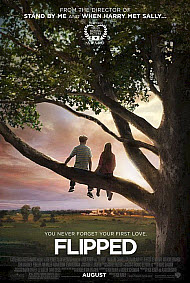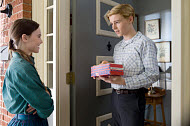Flipped
 for language and some thematic material.
for language and some thematic material.
Reviewed by: Scott Brennan
CONTRIBUTOR
| Moral Rating: | Better than Average |
| Moviemaking Quality: |
|
| Primary Audience: | Family Teens Adults |
| Genre: | Coming-of-Age Romance Comedy Drama |
| Length: | 1 hr. 30 min. |
| Year of Release: | 2010 |
| USA Release: |
August 6, 2010 DVD: November 23, 2010 |




TRUE LOVE—What is true love and how do you know when you have found it? Answer
| Featuring |
|---|
| Rebecca De Mornay, Aidan Quinn, Madeline Carroll (Juli), Anthony Edwards, Penelope Ann Miller, John Mahoney, Morgan Lily (Young Juli), Callan McAuliffe (Bryce), Stefanie Scott (Dana), Kevin Weisman, Shane Harper (Matt Baker), See all » |
| Director |
| Rob Reiner — “The Bucket List,” “The Princess Bride,” “A Few Good Men,” “When Harry Met Sally…” |
| Producer |
| Castle Rock Entertainment, Warner Bros. Pictures, Frank Capra III, Liz Glotzer, Alan Greisman, Rob Reiner, David Siegel |
| Distributor |
“You never forget your first love.”
The word “flipped” has several definitions in almost any online dictionary—most of them having to do with turning something over, tossing something, turning pages and so on. Or, if you are a crime-drama-junkie, then you’re probably familiar with a more recent adaptation of the word’s meaning as in: when a witness was “flipped” by the prosecution to help shore up their case. However, this Rob Reiner film, by the same name, refers to the good old-fashioned use of the word meaning “get excited over something you find attractive,” as in, “This reviewer ‘flipped’ over this heart-tugging-mature-family film.”
“Flipped” is a great addition to the coming of age genre, one I believe will join the ranks of other favorites like “Stand by Me” and “Au Revoir les Enfants,” although maybe not quite as fast. Anyone who grew up in the era will undoubtedly relate to this nearly flawless depiction of life in the early 60’s in Middle America, a la Ann Arbor, Michigan. But the attraction doesn’t stop there, because the story is universal: first loves, crushes, and all that goes along with them, is something everyone can relate to in any age. It’s part of the human story. It has the same timeless exterior of the recent film release “Ramona and Beezus,” in terms of its positive appeal to nostalgia, but with much greater depth, since this film is targeted for adults, as well as young people.
Reiner co-wrote “Flipped” with Andrew Scheinman (“A Few Good Men” producer) based on the novel of the same name written by Wendelin Van Draanen, and with his inimitable style as a director (“Stand by Me,” “The Bucket List”), Reiner successfully enrolls the audience in a heart-tugging story that stirs a lot of emotion and a few tears. Without giving away anything in this very predictable plot, I can say that Reiner does manage to build in the “flipped” connotations in multiple ways that give intensity to the film psychologically. There are intelligent montage sequences that outline the unrequited love which develops between the lead character, Bryce Loski (new rising star, Callan McAuliffe) and the girl, Juli Baker (Madeline Carroll, “The Spy Next Door”) who lived across the street from him at 243 Bonnie Meadow Lane. Each tableau is brilliantly filmed by Thomas Del Ruth and expertly edited by Robert Leighton.
The film starts in 1st grade in the late 1950’s and quickly ends up in the 8th grade in the year 1963 where the rising action gets into full swing. What sets this movie apart from many others like it, one of several things that make it well worth the ticket price, are the interesting “back and forth” narratives of each character, replaying the same scenes (with uniquely different viewpoints and settings) but from their own “he said-she said” perspective, all of which stays true to the book (although rewritten into the 60’s setting by Reiner). The prominent editing feature to depict these transitions is original and amazing. The last film I remember with montage sequences and transitions which were this innovative was during the Academy Award winning film “The Sting”, which goes a long way back.
The smooth flow of this cohesive cast speaks not only to their talents as actors and the excellent direction by Reiner, but also to the articulate choices made by the casting of Janet Hirshenson and Jane Jenkins. The supporting roles played by John Mahoney (“Frazier”), Rebecca De Mornay (“Hand that Rocked the Cradle”), Aidan Quinn (“Legends of the Fall”) are also exceptional, with a stand-out performance by Anthony Edwards (of “ER” fame). [With this role, I believe he officially crosses over to film as a bona fide movie star—if he hadn’t done so before.]
You know this film. Girl has crush on boy at first grade. Boy doesn’t really care for her, but he can’t really avoid her because she lives across the street. Girl is a dreamer, strong-willed, with an alluring love for life. Boy resists the urge to follow that dream with her or join her on the highest branches of the neighborhood sycamore tree—which becomes the metaphor for the rest of the film. The tree is the place without prejudice, where clarity of site brings truth, insight, and purpose for living. Enter stage left; grandpa suggests to boy that there may be more to this book than what is on the cover—speaking about the girl. Boy is now a blooming adolescent who has really messed things up, but now he “flips” and is really interested. His grandpa said, “Some of us get dipped in flat paint, some in satin, some in gloss… But, every once in a while, you find someone who’s iridescent, and when you do, nothing will ever compare.” Grandpa was reminiscing about his deceased wife when he said this, but the boy takes it to heart. The question becomes: Is the young man too late to win her over?
Content for concern
PG is the appropriate rating for the film, with a few minor words that escaped the editor’s knife. There is: one “What the he**?”, one “Go to he_ _!”, one use of the word “a**hole”, and two uses of the word, “s*it”. There are two times where the Lord’s name is profaned, including one “For Christ’s sake” (which I used to flinch at when I heard it in conversation, but which I now generally use as a starting point to witness to the person—something along the lines of “Don’t you mean—“for our sakes, Christ died!”?) Seriously, the curse words, though few, really looked out of place in this film. The only other minor infraction was an error in vernacular for the period when someone used the 90’s phrase, “visually challenged.” It may have been used in the 60’s, but it certainly wasn’t commonplace and definitely not in the context it was given.
There are some strong emotional family dinner scenes, and one that ends with a slap across the face, which is about the extent of the violence, unless you want to count a real live snake eating a real live egg and spitting it out.
There is no sex, no kissing, no nudity, and only one minor sexual inference mentioned by Bryce’s older sister when she caught him hiding something in his binder which she assumed to be a Playboy magazine.—It wasn’t, but he didn’t deny it. Bryce’s dad also encourages his son to lie about something, which Bryce later says in his narration, that he didn’t feel right about doing—a credit to a moral compass built into the film, only we are not given the source of the “moral gravitational pull.”
There is no family prayer at meals, and no mention of God, either at home or at school, which, for me, seemed a bit unrealistic for the setting, considering The 10 Commandments and prayer in public schools were commonplace up until the final year of the film’s setting. There was only one line where Juli is reflecting on something her mom had said which was she was “thankful for her blessings”—the only hint of direct biblical spirituality in the entire film.
Overall thoughts and spiritual significance
I know that the content for concern looks extensive, but that’s only because this movie was so visually beautiful and nearly perfect in so many ways, that it was easy to see and write down the few black crumbs on this gorgeous plush white velvet. It wasn’t a classic like “The Secrets of Jonathan Sperry” from last year—where the gospel was in plain sight, and the moral rating is at the top, but it’s still very good.
The wonderful themes in this film are worth meditating on at length, like 1) really getting to know people before you judge them, in fact, don’t judge them at all, but know them by their character [Matt. 7:1 and Matt. 7:16] 2) speaking out in public when you hear something being said that you know is not true, especially stereotypes [pointing out anti-Semitism, or anti-Christian rhetoric in public discourse is my personal favorite as of late] [1 Peter 2:12, Lev. 19:16] and finally 3) allowing people the space to change and believing in them, like Christ does for us, so that even if they fail, we can forgive them, as He does for us:
“My little children, these things I write to you, so that you may not sin. And if anyone sins, we have an Advocate with the Father, Jesus Christ the righteous” (1 John 2:1).
These inferential themes, and many more, are present in this touching and moving piece of art, which would make a great place to begin a discussion with teens, friends or even a spouse. This film deserves to be seen and not rented. It has high Oscar® potential in a few categories, to be sure. You’ll be hearing about it again next February during awards season, of that I can almost be certain.
Throughout the film, Juli has to ask herself a question about something her dad taught her regarding life, “You have to look at the whole,” he said. “Sometimes the whole is greater than the sum of its parts.” That sums it up for me, and explains why I flipped over “Flipped.” Rob Reiner is no theologian, and I disagree with his politics, but he certainly is a master story teller, and this story is greater than the sum of its parts.
Violence: Minor / Profanity: Minor / Sex/Nudity: None
See list of Relevant Issues—questions-and-answers.


There are perhaps 4 cuss words in this movie, and they are strikingly out of place, and needless, and absolutely don’t fit the idea or feel or plot of the movie, however, it’s obvious upon viewing that this movie was destined for a “G” and the director and the money suppliers were worried that this would kill the extra chance of success, so they had the exact number of cuss words inserted and the right ones chosen that would guarantee that it was stamped with a “PG” by the board, and this was just so UNNECESSARY, as this movie is a rare instant classic and will remain so… and deservedly so… You will flip for this movie… watch and see…
Moral rating: Good / Moviemaking quality: 5
none
Moral rating: / Moviemaking quality: ½
Overall, I totally recommend this movie. It’s so wholesome—we plan to add it to our DVD collection!
Moral rating: Better than Average / Moviemaking quality: 5


We DIDN’T have to squirm in our seats, get up and leave, or repent about staying. Rob Reiner did a great job of giving us some good old fashioned entertainment, without the profanity, sex, or garbage that Hollywood puts into almost every movie. Please go and see “Flipped,” you will love it!!
My Ratings: Moral rating: Better than Average / Moviemaking quality: 5